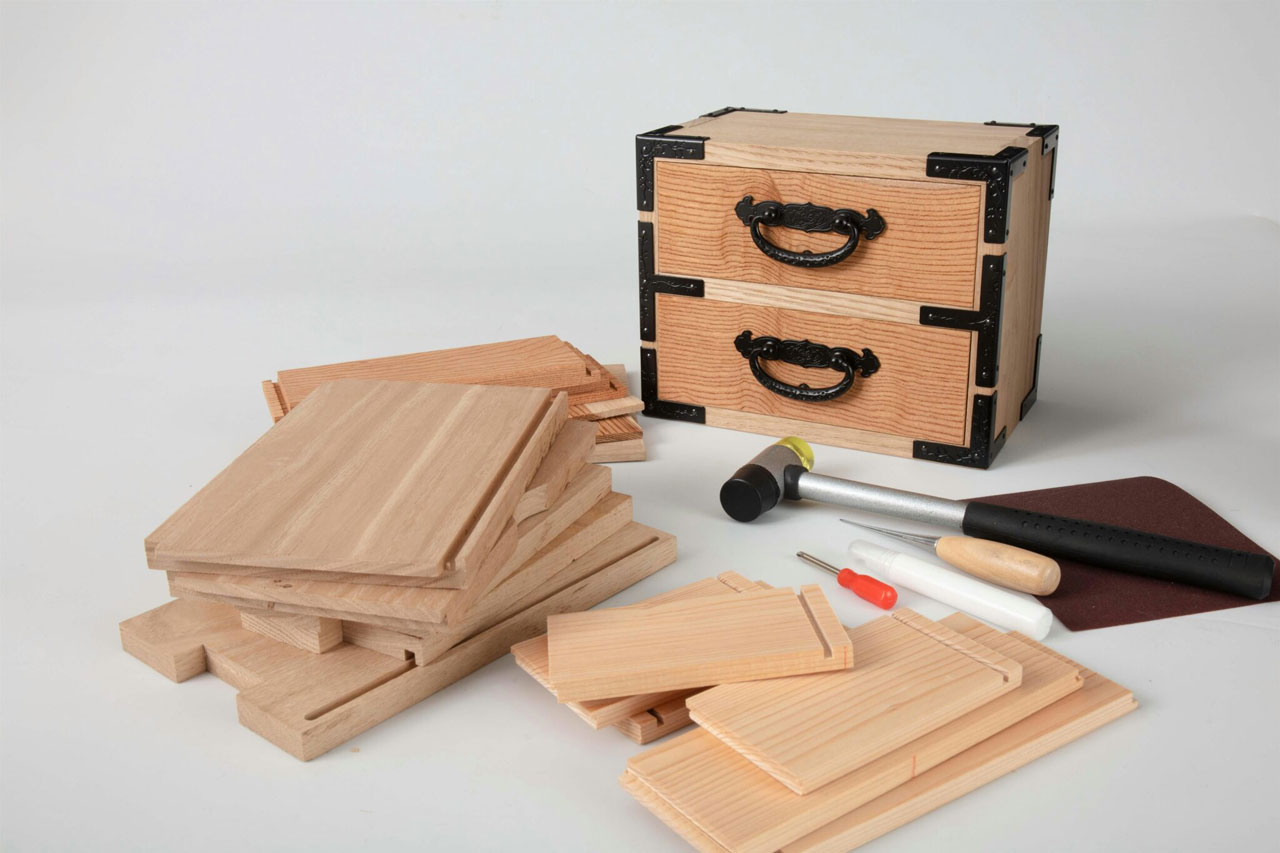
Build a tabletop Sendai tansu (samurai chest)
- 19 July 2025
- 17:00 - 19:00
- The Hall, Japan House London, 101-111 Kensington High Street, London, W8 5SA
- https://www.japanhouselondon.uk/whats-on/build-a-tabletop-sendai-tansu/
- +44 (0)20 7932 7100
- info@japanhouselondon.uk
- Tweet
Build your own small-scale Sendai tansu in this hands-on workshop led by master craftspeople from Miyagi Prefecture.
Sendaitansu are ornate yet practical chests of drawers from northeastern Japan, admired for their masterful joinery using zelkova wood and distinctive ornamental iron fittings.
In this workshop, learn about the history and techniques of Sendai tansu before assembling your own compact version. Using pre-cut pieces of zelkova wood and wood glue, you will construct the chest and then attach metal fittings using nails and a hammer.
Following the workshop you can take home your completed mini tansu – a handcrafted keepsake and introduction to this enduring tradition.
While original Sendai tansu were large enough to store samurai swords, these small-scale versions measure approximately 20 cm wide, 13 cm deep, and 16 cm high – perfect for displaying on a tabletop or desk.
This workshop forms part of a wider programme including a talk on the history and characteristics of Sendai tansu (17 July), hands-on metal embossing workshops (18 July) and craft demonstrations (18 and 19 July).
The event series is presented as part of the Spotlight on Local Japan Programme which accepts applications from potential collaborators based in Japan to co-create cultural events presenting Japan’s regional diversity at Japan House London.
Tickets for the event are non-refundable. Please read our Terms and Conditions for Event Ticketsbefore purchasing your ticket.
Please note that filming and photography may take place at this event. Photos and footage of the event may then be used to promote Japan House London, helping more people to discover what we offer. If you have any concerns, please contact us online or contact a member of the team on site.
About the speaker
Yunome Rikiya (Sendai Tansu Cooperative Association)
Yunome Rikiya is the sixth-generation managing director of the Yunome Furniture Department Store, which was founded in 1871. After the 2011 Great East Japan Earthquake, he worked to have Sendai tansu officiallydesignated as a ‘Traditional Craft of Japan’ by the Ministry of Economy, Trade and Industry, succeeding in 2015. In recent years, he has collaborated with Studio Swine, a design collective composed of a Japanese architect and a British artist.
Sekiya Shūichi
Sekiya Shūichi is a furniture craftsman responsible for the wooden structure of Sendai tansu. Born in a mountain village in Miyagi Prefecture, he developed an early interest in the trees around him and in crafting objects from them. He believes that Sendai tansu, with their enduring strength and timeless beauty, represent the highest value of wood as a material. Through his craft, Sekiya aims not only to preserve craft traditions but also to contribute to environmental sustainability by extending the life of wooden resources.
Kanno Yūki
Kanno Yūki is a specialist in the urushi lacquering of Sendai tansu. After completing an apprenticeship under Hasabe Yoshikatsu, he established his own studio under the name Chōshichirō and strives to create Sendai tansu that reflect contemporary sensibilities. His practice now extends beyond tansu to include the lacquering of buildings such as shrines and temples, primarily in the Sendai area. In addition to his work as a craftsman, he serves as a vocational training instructor. In 2019, he received the Director-General’s Prize at the National Traditional Crafts Competition.
Hasebe Yoshikatsu
Hasebe Yoshikatsu is the 12th-generation head of a family that has practised urushilacquering of Sendai tansu for over 160 years. He played a key role in the craft’s national designation and is dedicated to training the next generation. After the 2011 Great East Japan Earthquake, he repaired damaged tansu, and realised how beloved Sendai tansu are in the local community. Concerned about the decline in metal fitting artisans, he has recently taken on the challenge of becoming a metalworker himself. In spring 2024, he received the Order of the Sacred Treasure, Silver Rays, conferred by the Emperor of Japan.
Booking Essential | £90
Please note that there are only 20 places per session.
Participants must be over 18 years old.
